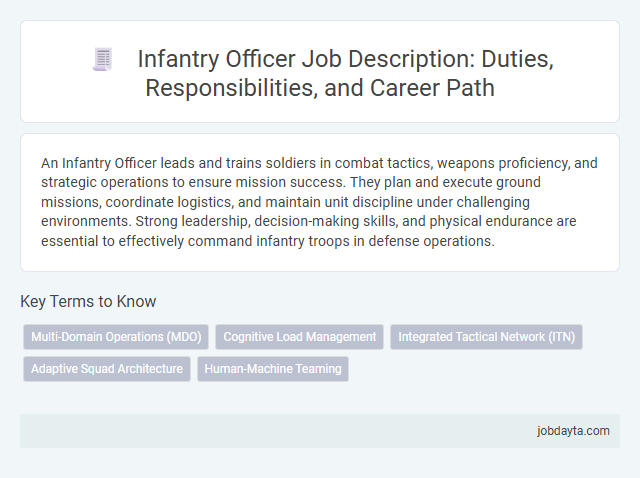An Infantry Officer leads and trains soldiers in combat tactics, weapons proficiency, and strategic operations to ensure mission success. They plan and execute ground missions, coordinate logistics, and maintain unit discipline under challenging environments. Strong leadership, decision-making skills, and physical endurance are essential to effectively command infantry troops in defense operations.
Overview of Infantry Officer Role
What are the primary responsibilities of an Infantry Officer? Infantry Officers lead and coordinate infantry troops during combat and training operations. They are responsible for tactical planning, ensuring unit readiness, and maintaining discipline within their squads.
Core Duties and Responsibilities
An Infantry Officer leads troops in ground combat operations, ensuring strategic execution of missions. They plan, coordinate, and supervise training exercises to maintain combat readiness and effectiveness. These officers are responsible for maintaining discipline, morale, and welfare of their soldiers in challenging environments.
Key Skills and Qualifications
| Key Skills |
|
|---|---|
| Qualifications |
|
Training and Education Requirements
Infantry Officers undergo rigorous training to develop leadership skills, tactical knowledge, and physical endurance essential for commanding infantry units. Your education typically involves completing Officer Candidate School followed by specialized infantry training programs.
Training emphasizes weapons proficiency, battlefield strategy, and small unit tactics to prepare officers for combat scenarios. Education includes courses on military history, ethics, and advanced decision-making techniques. Continuous professional development ensures Infantry Officers remain effective leaders in evolving operational environments.
Leadership and Command Responsibilities
An Infantry Officer leads and manages ground troops during military operations, ensuring mission success through tactical expertise and decisive action. Command responsibilities include planning, coordinating, and executing combat strategies while maintaining soldier welfare and unit discipline. Effective leadership fosters cohesion, morale, and operational readiness within the infantry unit.
Operational and Tactical Planning
Infantry Officers play a pivotal role in Defence by designing and executing operational and tactical plans that ensure mission success on the battlefield. Their expertise in strategy and real-time decision-making directly influences the effectiveness and safety of infantry units during combat operations.
- Operational Planning - Develops comprehensive mission frameworks aligning military objectives with available resources and intelligence.
- Tactical Planning - Crafts detailed, ground-level action plans focusing on maneuvering troops and equipment to achieve specific combat goals.
- Risk Assessment - Evaluates potential threats and battlefield scenarios to minimize casualties and maximize operational efficiency.
Effective operational and tactical planning by Infantry Officers enhances the coordination and adaptability of infantry units in dynamic combat environments.
Physical and Mental Fitness Standards
Infantry Officers must meet rigorous physical and mental fitness standards to effectively lead troops in demanding combat environments.
Their training emphasizes endurance, strength, and psychological resilience as key components of operational success.
- Physical Endurance - Infantry Officers are required to complete strenuous physical tests including long-distance marches and obstacle courses to ensure peak body condition.
- Mental Resilience - Regular psychological assessments evaluate stress management and decision-making abilities under pressure to maintain combat readiness.
- Strength and Agility - Officers must demonstrate superior muscular strength and quick reflexes essential for close-quarters battle scenarios.
Career Progression and Advancement Opportunities
An Infantry Officer plays a critical role in leading ground troops during military operations, ensuring mission success through strategic planning and tactical execution. Career progression within this role is structured, with clear pathways from junior officer ranks to senior leadership positions.
Advancement opportunities include specialized training programs, command assignments, and staff roles that enhance leadership skills and operational expertise. Performance, experience, and continuous professional development significantly influence promotion prospects and career growth for Infantry Officers.
Challenges and Rewards of Being an Infantry Officer
Serving as an Infantry Officer demands exceptional leadership skills and resilience in high-pressure combat scenarios. The role offers unique opportunities for personal growth and significant contributions to national security.
- High-stress environment - Infantry Officers operate in intense, unpredictable conditions requiring quick decision-making under pressure.
- Team leadership responsibility - Leading infantry units involves managing soldier morale, training, and mission execution effectively.
- Sense of accomplishment - Successful missions and soldier development provide profound personal and professional satisfaction.
Future Trends and Innovations in Infantry Roles
Infantry officers are adapting to rapid technological advancements that enhance battlefield awareness and decision-making. Integration of augmented reality (AR) and advanced communication systems transforms traditional infantry strategies into dynamic, data-driven operations.
Future trends emphasize autonomous ground vehicles and AI-powered analytics to support infantry units in complex environments. Your role will increasingly involve managing these cutting-edge tools to maintain tactical superiority and operational efficiency.
Related Important Terms
Multi-Domain Operations (MDO)
Infantry Officers lead ground combat forces by integrating capabilities across land, air, sea, cyber, and space domains to execute Multi-Domain Operations (MDO) effectively. Their expertise in coordinating joint fires, intelligence, and maneuver warfare enhances battlefield adaptability and ensures dominance in complex, interconnected operational environments.
Cognitive Load Management
Infantry Officers employ advanced cognitive load management techniques to enhance decision-making speed and accuracy under combat stress, utilizing situational awareness and multitasking strategies. Effective cognitive load management improves operational effectiveness by enabling rapid interpretation of complex battlefield information and prioritizing critical tasks during high-intensity missions.
Integrated Tactical Network (ITN)
Infantry officers utilize the Integrated Tactical Network (ITN) to enhance battlefield awareness and streamline real-time communication among units, significantly improving decision-making and operational efficiency. The ITN's robust connectivity and data-sharing capabilities enable infantry leaders to coordinate maneuvers, manage resources, and execute missions with increased precision and situational understanding.
Adaptive Squad Architecture
An Infantry Officer leverages Adaptive Squad Architecture to enhance battlefield flexibility and operational effectiveness by organizing modular, task-focused units tailored to diverse combat scenarios. This approach integrates advanced communication systems, real-time intelligence, and versatile weaponry to optimize squad performance and rapid decision-making under dynamic combat conditions.
Human-Machine Teaming
Infantry Officers play a critical role in Human-Machine Teaming by integrating advanced autonomous systems and AI-driven technologies to enhance situational awareness, decision-making, and combat effectiveness. Their expertise in coordinating manned units with unmanned ground vehicles and robotic support platforms significantly improves mission adaptability and operational success in complex battlefield environments.
Infantry Officer Infographic

 jobdayta.com
jobdayta.com